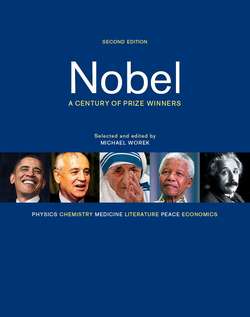Читать книгу Nobel - Michael Worek - Страница 59
На сайте Литреса книга снята с продажи.
ОглавлениеFrederick Banting (1891–1941)
1923 Physiology or Medicine
For the discovery of insulin.
The discovery of how to isolate insulin, the hormone that allows diabetic patients to combat excessive glucose in their blood, brought the Canadian Frederick Grant Banting and John James Richard Macleod the 1923 Nobel Prize in Physiology or Medicine.
It was Banting, along with his assistant Charles H. Best, who was the first person to successfully extract insulin from the pancreas. The Karolinska Institute in Stockholm, Sweden, which is responsible for attributing the Nobel Prize, decided, at Banting’s suggestion, to also recognize Macleod, who had been receptive to the idea and offered his facilities for research.
Born in Alliston, Ontario, Canada, Frederick Banting was the youngest of five children. He completed his high school studies in his hometown then moved to Toronto. Although he initially enrolled in theology, Banting soon transferred to medicine. He graduated in 1916 and immediately enlisted in the Canadian Army Medical Corps and was sent to France. He was wounded during the battle of Cambrai, and later received the Military Cross for heroism under fire.
After the war he served as a doctor in several communities until he completed his MD in 1922. By this time he had already taken an interest in diabetes and related his ideas to a receptive John Macleod, then a professor of physiology at the University of Toronto. Born in Scotland, Macleod had traveled the world since obtaining his honors degree in medicine in 1898. He had worked in Leipzig, London, Cleveland and Montreal before he met Banting.
Besides the Nobel Prize, both received various awards and honorary titles. Macleod left a vast body of published work for posterity. Both Banting and Macleod loved to paint, and Banting even participated in a government-sponsored painting expedition above the Arctic Circle.
Macleod lived with his wife, Mary McWalter, and Banting married twice, first to Marion Robertson, with whom he had a son before their divorce, and then to Henrietta Ball. When World War II began, Banting served as a liaison officer between the English and American medical services. He was killed in a plane crash in Newfoundland while on active service.
Banting and Macleod each received half of the prize.
